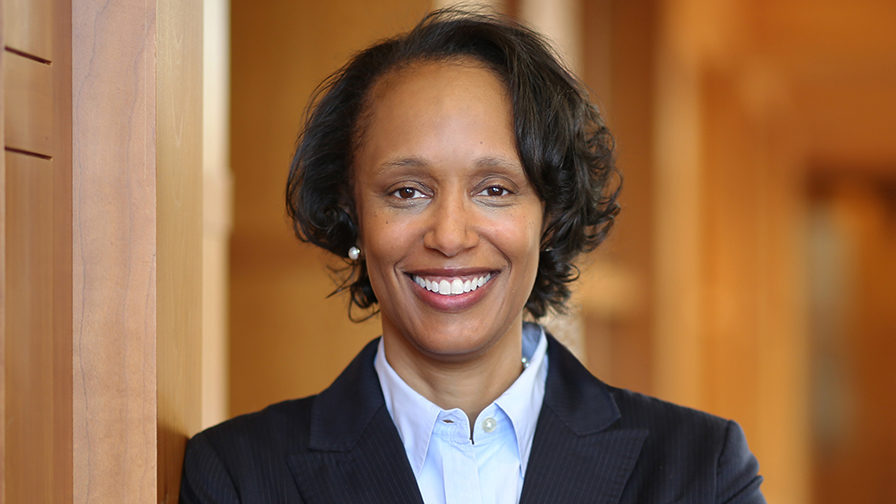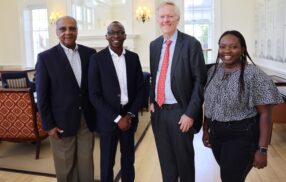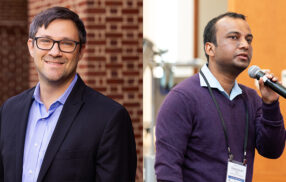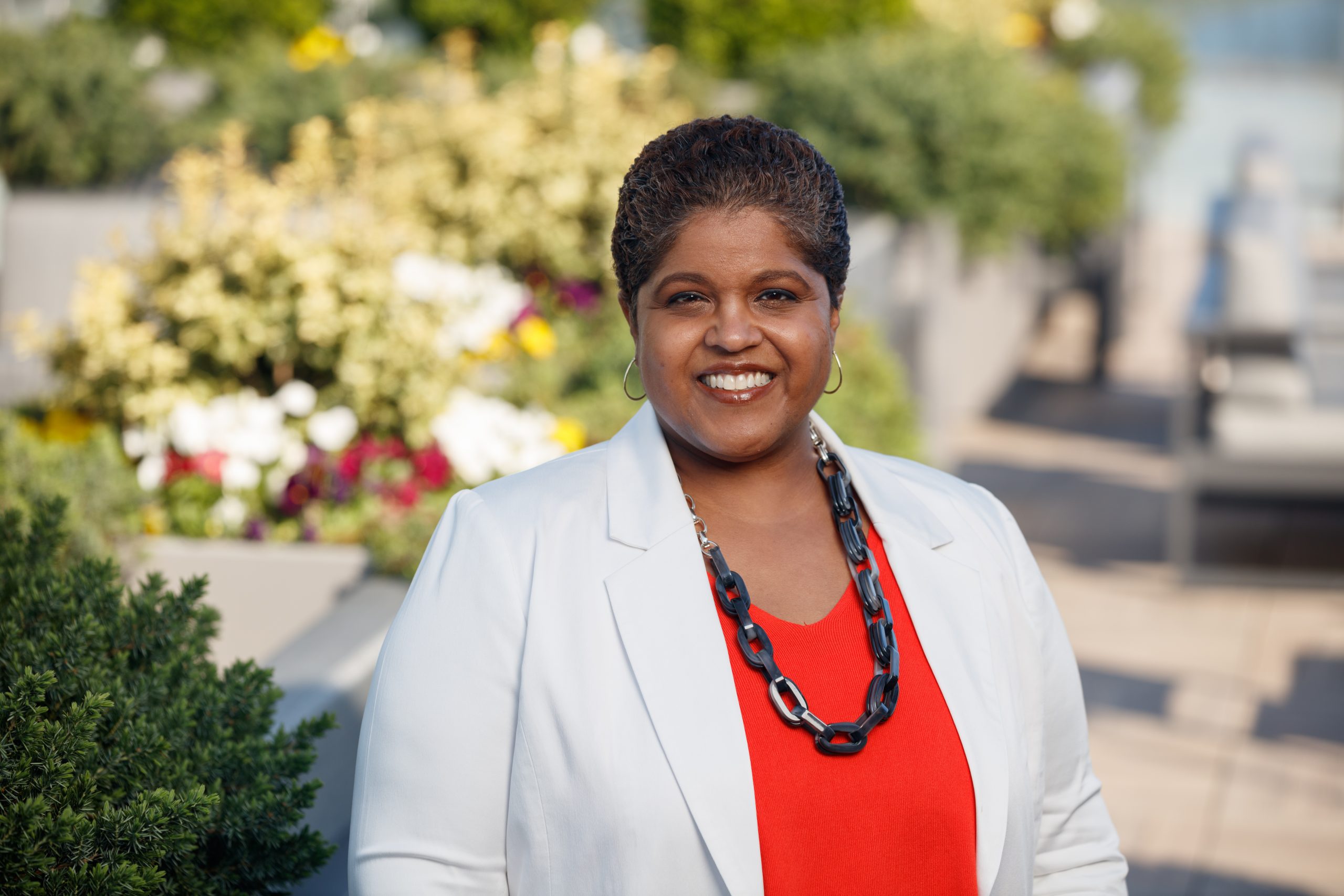
UVA Partnership for Leaders in Education Webinar Advances Work in Educational Equity
By Dallas Hambrick Hitt
UVA Law Professor Kimberly Robinson, Acclaimed Superintendent Lamar Goree Offer Insights
The critical nature of equity in U.S. public schools is often expressed in terms of a moral imperative. UVA School of Law Professor Kimberly Robinson argues that equity in schools is actually a legal imperative with strong support from the federal government that is codified in legislation and policy.
“We can use state and federal state law to move this work forward,” said Robinson. “These laws are imperatives because school districts often receive millions of dollars from the federal government.”
This was one of the key takeaways in a recent webinar, “How Do You Ensure Your School Systems’ Equity Plan Makes a Difference?,” sponsored by the University of Virginia Partnership for Leaders in Education (UVA-PLE) in December. A joint venture between the UVA Darden School of Business and School of Education and Human Development, UVA-PLE combines innovative thinking in business and education in an effort to best serve educators and children. Robinson shared key insights from both her scholarship and practice on the legal imperative of equity with a group of over fifty district and school leaders from around the country. Any district that receives federal education funds is subject to the requirements that the webinar addressed.
According to chief of programs for UVA-PLE Scott Guggenheimer, the purpose of bringing Robinson and schools district leaders together was to advance the collective understanding of how to “eradicate predictable life outcomes based on individual or communal characteristics.” The webinar was another example of UVA-PLE’s commitment to bringing expertise to accelerate practitioners efforts to co-create solutions that address their most persistent challenges at the district and school levels.
The webinar launched by hearing from district leaders about why they chose to attend a session on equity. One participant’s reflections sparked agreement from many others when she noted that there is an increase in interest and acceptance from educational stakeholders about the need to work on issues of equity, but the struggle lies in the reality that commitment does not necessarily reveal insight into what actions leaders can take to ensure equity in schools.
“Once we commit to do this, I am still paralyzed. I am unable to know where to start. There is just so much,” is how one participant captured the conundrum.
Without having a plan for both growing support of equity and taking action to make changes for equity, school districts can become uncertain on how to proceed.
To address this challenge, Robinson used her time in the webinar to lead participants through consideration of how the legal imperative for equity can be wielded as an impetus for initiating change, as well as an impactful lever for planning and taking action on advancing equity in public schools. In responding to the struggle for where to start or how to proceed, Robinson used an analogy to communicate that steady work and taking action were keys to realizing a district’s equity goals. Said Robinson: “It is like answering the question of how do you eat an elephant? You do it one bite at a time.”
In order to catalyze planning and action for equity, Robinson presented webinar participants with several legal “tests” to assist school districts. One example was a disparate impact test with three parts from the Civil Rights Act of 1964 that walked practitioners through how to determine if a school district’ policies or practices have a disparate impact on the basis of race, color or national origin and if that disparate impact was legally justified. Teams engaged in the webinar discussed how combining such analysis alongside learning from voices of those most impacted by challenges and research on effective system practices ignites ideas for how to redesign systems to meet unaddressed needs.
Robinson also touched on how school districts can conduct a self-analysis and look for points of inequity in districts and schools, including in such areas as teacher quality, academic programs, technology and facilities. She also noted that “academic tracking and student discipline are ripe for analysis.” According to Robinson, schools are often imbalanced in racial and ethnic backgrounds in advanced placement and gifted and talented programs and classes. In addition, research confirms that children of color, particularly African American and Hispanic students, receive more frequent and harsher school discipline.
The Office of Civil Rights (OCR) can become involved in instances of intentional or disparate impact discrimination because federal law is clear that federal monies have equity stipulations that must be met.
According to Robinson, the OCR can work with school districts for resolutions for equity if a complaint is filed or OCR initiates a compliance review. However, her message was clear — it is better for districts to be preventative and proactive about complying with civil rights requirements than to be required by OCR to comply.
In that vein, Robinson noted that school districts should not delay action because there are stakeholders who do not support educational equity, explaining that it is unrealistic for district leaders to expect that they will ever have a perfect buy-in from everyone involved.
The reality, Robinson explained, is that in educational equity work “there are often three groups — the choir who is 110 percent behind; the middle who is willing to consider where inequities issues are and work to correct them; and then the opposition — they are opposed because the status quo is working for them. This is the group that the legal imperative can be used with to address resistance.” Robinson stated, “The work is not optional — it is essential.”
A Case Study of Success in Louisiana
The UVA-PLE webinar participants also heard from Dr. Lamar Goree, superintendent of Caddo Parrish Public Schools (CPPS) in Louisiana. Under his leadership, and in partnership with UVA-PLE, many schools in CPPS have undergone transformation to include a focus on educational equity. According to Goree, not only has the quality of teachers improved, but student arrests decreased from 400 to eight in the time of just one year when they began to focus on equity.
Goree’s presentation highlighted how some of the concepts from Robinson’s work were embedded in CPPS. CPPS framed their educational equity challenge as a lack of highly qualified leaders and teachers for its lowest performing schools serving a majority of Black students, and made a commitment to attracting committed and capable leaders and teachers for schools serving their students.
“The first conversation we had with UVA-PLE was the quality of the leader in these schools. We began with selecting a ‘shepherd’ with an equity mindset — someone willing to walk away if they cannot advance equity. We vacated 10 spots and systematically hired for the leadership characteristics we knew mattered,” Goree explained.
“Every child has a civil right to be taught on grade level. We had to ask ourselves: Do we have interventions in place to support them and scaffold?”
To underscore his point, Goree shared how once Caddo had a high quality human resources approach in place, they could focus on instruction.
The work that Goree and his team accomplished led to major advances in multiple equity challenges, leading to the elimination of one of the parish’s alternative schools due to improvement in student discipline rates.
Goree also spoke to how eight of the 10 schools they launched the transformation work with grew student achievement significantly, with multiple schools winning state accolades. To sustain the work, Goree spoke about how investing teacher leadership to support novice teachers and opportunities for promising teachers in underserved schools to receive advanced training increased retention and the quality of teaching and learning across schools.
According to William Robinson, executive director of UVA-PLE, examples such as Caddo Parrish underscore the possible transformational results when local leaders leverage leading research as a foundation to build from and customize community-based solutions that meet their stakeholders’ needs.
“There are strong, research-proven practices for ensuring systems are responsive to student needs by, for instance, ensuring high quality literacy curriculum and pedagogy or addressing disproportionality in access to quality teachers or rigorous content,” said the PLE executive director. “We are seeing across the country that when educational leaders like those on the webinar today insist upon a high-quality and empowering learning experience for marginalized populations, they can unlock ideas and energy to better serve students.”
UVA-PLE is capturing learning and resources from national partners engaged in advancing equity to integrate into their multiple-year partnerships with schools and school systems that are committed to accelerating student learning and opportunity. Contact UVA-PLE to learn more about their research, partnerships and resources.
About the UVA Partnership for Leaders in Education
Founded in 2003, the University of Virginia Partnership for Leaders in Education (UVA-PLE) is a joint venture between the UVA’s Darden School of Business and School of Education and Human Development that combines the most innovative thinking in business and education to better serve our nation’s children. UVA-PLE’s vision is to be a national leading source for insights and support to help school systems develop their leadership capacity and create the conditions in which teachers and students sustainably thrive.
The University of Virginia Darden School of Business prepares responsible global leaders through unparalleled transformational learning experiences. Darden’s graduate degree programs (MBA, MSBA and Ph.D.) and Executive Education & Lifelong Learning programs offered by the Darden School Foundation set the stage for a lifetime of career advancement and impact. Darden’s top-ranked faculty, renowned for teaching excellence, inspires and shapes modern business leadership worldwide through research, thought leadership and business publishing. Darden has Grounds in Charlottesville, Virginia, and the Washington, D.C., area and a global community that includes 18,000 alumni in 90 countries. Darden was established in 1955 at the University of Virginia, a top public university founded by Thomas Jefferson in 1819 in Charlottesville, Virginia.
Press Contact
Molly Mitchell
Associate Director of Content Marketing and Social Media
Darden School of Business
University of Virginia
MitchellM@darden.virginia.edu





